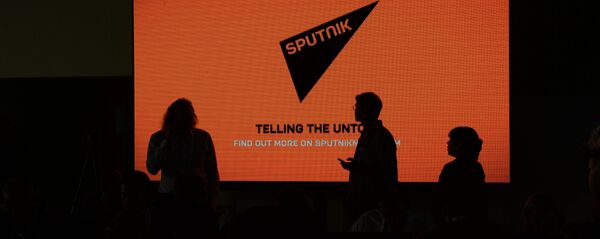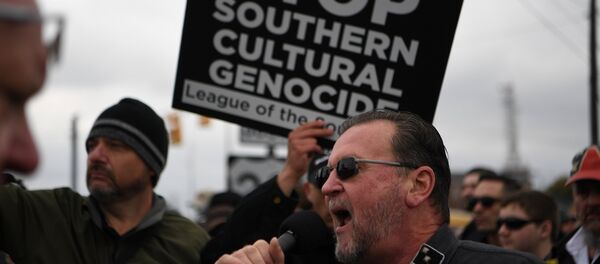According to various media reports, Dees was ousted amid multiple allegations of sexual harassment and racial mistreatment of his staffers. In turn, Cohen resigned reportedly in a bid to assist the group in implementing findings of an internal investigation. Moreover, the SPLC itself is reportedly notorious for falsely branding their opponents as "hate groups" in an effort to crush them rather than debate their ideas honestly.
Sputnik has discussed the issue with Ron Coleman, a lawyer and Chairman of the Firm’s Intellectual Property and Brand Management Practice Group, and a member of its Commercial and Corporate Litigation Practice Groups.
Ron Coleman: “Legitimate” is as loaded a word as “hate group”! In American sensibility and under our First Amendment, it is legitimate to express your opinion about others.
But doing so comes with moral responsibility, especially if you speak from a position of perceived authority.
If you have an opinion that someone is a hate group or an extremist, and hold out your opinion as if it is objective, even authoritative, fact, that moral responsibility is profound. And if it is not taken seriously enough, it may lead to legal responsibility for the predictable consequences to others resulting from your use of such labels.
Sputnik: As you may know, the SPLC has demanded sanctions from the DC federal court for the RICO (Racketeer Influenced and Corrupt Organizations Act) suit. In whose favor do you think the trial will end?
Ron Coleman: The question is whether the suit will even go to trial. If the lawsuit survives SPLC’s motion, that in and of itself would be a favorable outcome – if only to a limited extent – for CIS [Center for Immigration Studies].
Sputnik: According to CIS Director Mark Krikorian, “SPLC attacks us simply because it disagrees with these policy views”. The CIS has accused the SPLC of “engaging in wire fraud to prop up a conspiracy designed to destroy them”. How true are these accusations?
Ron Coleman: It is absolutely true that SPLC attacks organizations because it disagrees with their policy views. This has been documented extensively. I do not have any way of knowing, however, if SPLC has engaged in wire fraud or a conspiracy directed at CIS.
Sputnik: The official website of the SPLC says that it “monitors hate groups and other extremists throughout the US and exposes their activities to law enforcement agencies”. Why is this organization involved in such monitoring rather than the police?
Ron Coleman: Law enforcement focuses on crime – which is to say, on action or conduct that violates the law.
SPLC, in contrast, asserts the power to look into the hearts of men judge who shall live and who shall die in civic life. We are grateful that the police do not yet do this in our country.
Sputnik: Many conservative leaders have sent a letter to Facebook, Google, Twitter, and Amazon asking them to cut ties with the SPLC. In your opinion, what could be behind the cooperation between this organization and these tech giants? Why are these companies cooperating with the SPLC, considering past privacy scandals and congressional hearings?
Ron Coleman: SPLC is an iconic “brand name” among civil rights groups. The idealistic brand equity of organizations in that business – such as the American Civil Liberties Union and the Anti-Defamation League – lingers on long after such organizations are transformed into partisan political or ideological enforcers or pressure groups.
Most are run by relatively young people who crave the political and cultural legitimacy associated with leading brands in the civil rights business or at least the legitimacy they those names confer in the bubbles those executives live in.
Sputnik: In the letter, the SPLC is accused of being “a hate-filled, anti-Christian, anti-conservative organization and nothing more than a weapon of the radical left, whose goal is to bully people into compliance with their ideology”. Why have conservative Christians become a target of this organization and these companies? What legal ways are there to protect them? Why have anti-Christian and anti-traditional values become the new norm?
Ron Coleman: As the scholar, Yoram Hazony has observed in his study of nationalism, liberalism is a conquering, absolutist global religion. And like others before it, its universalist nature requires that institutions and beliefs that compete for hearts, souls, and gold must be destroyed.
This does not include the mainline religious dominations in the West, which have largely been coopted and whose clergy identify the path to redemption with the one to progressive self-esteem. In contrast, Christian, chiefly evangelical, and orthodox Jewish organizations are the last bastions of traditional mores in the United States.
Elites in the judiciary, academia, and media have been waging open war against the values associated with “cultural conservatism” for decades, and we are at a tipping point in that war.
Unfortunately, most people lack the tools or the courage to draw the line as “extremism” are defined by organizations such as SPLC as merely disagreeing liberal orthodoxy. As Hazony explains, this is not so much an attack on theology, as religious believers would use the word. Rather, it is meant to upend the entire political and cultural system bequeathed on the West by the Reformation.
It is an attack on the very concept that cultural, political and religious self-determination, variety and tolerance are acceptable, much less ideal.
Sputnik: How politically motivated are the actions of this organization? Could this organization be considered an instrument of political pressure?
Ron Coleman: SPLC’s motivations are entirely political, but that is not to say that it is a mere arm of the Democrats. It has, in fact, attacked positions and figures in that party.
But Democrats may be targeted, where doing so poses no political risk to the party (i.e., the risk of losing an election to Republicans), to help the SPLC’s ideological allies move the party’s positions ever further leftward. So, yes, SPLC is certainly a political pressure group.
Sputnik: The SPLC was included under section 501(c)(3) which exempts it from taxes. Sen. Tom Cotton wrote a letter to the IRS asking them to investigate whether the SPLC should retain its classification as a 501(c)(3) non-profit organization. In your opinion, what classification does the SPLC fall under? Should the IRS deprive them of their tax-exempt status?
Ron Coleman: I would never advise a 501(c)(3) organization, and I have represented many, to act as overtly politically as the SPLC does.
But what SPLC does do in the political arena is common, especially among left-leaning non-profits, including of course almost all private universities. There are many problems with the tax code’s treatment of super-wealthy “non-profits” whose leaders are paid extravagant salaries and live lavish lifestyles, and IRS enforcement of the restrictions on political activity is only one of them.
Views and opinions expressed in this article are those of Ron Coleman and do not necessarily reflect those of Sputnik.








